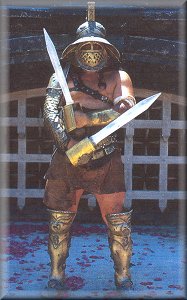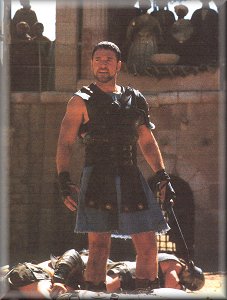
The gladiators
 The mortal combat of the gladiators originated from the funeral ceremonies of important Romans. The combat symbolised honour, strength and bravery. The death of the defeated combatant sped the spirit of the deceased on to the Roman afterlife.
As the wealth of the Romans grew, so too did the number of gladiators that would fight to the death at their funeral celebrations. The number of death matches became a status symbol; soon it became more and more fashionable until the death matches became less and less associated with the intricate funerary arrangements and more likened to a spectator sport.
The mortal combat of the gladiators originated from the funeral ceremonies of important Romans. The combat symbolised honour, strength and bravery. The death of the defeated combatant sped the spirit of the deceased on to the Roman afterlife.
As the wealth of the Romans grew, so too did the number of gladiators that would fight to the death at their funeral celebrations. The number of death matches became a status symbol; soon it became more and more fashionable until the death matches became less and less associated with the intricate funerary arrangements and more likened to a spectator sport.
The gladiators themselves came from a variety of different backgrounds. Some were highly trained professionals taught to perform their bloody art in special gladiator schools. Some were discarded slaves, others were merely criminals or captives from one of the many Roman wars.
The gladiators' combats were to become a symbol of Roman control and domination of the ancient world. The Romans were a particularly warlike people, ever prepared to use force to expand or defend their varied interests and their empire. As a military based society the Romans admired military skill and bravery above all else. This goes some way in explaining the popularity of the emperors that brought Rome glory through military conquest, Julius Caesar, Augustus-Caesar, Claudius, Marcus Aurelius and Hadrian to name but a few.
For the people of ancient Rome "bravery was the foremost virtue of the Romans who valued military service above the athletic achievements so beloved of the Greeks." This helps explain why gladiatorial contests became more popular than the less violent sporting contests of the Greeks and why the popularity of the ancient Olympic games became less popular after Greece was absorbed into the Roman Empire.
 The gladiators were the ultimate expression of military skill and bravery that fulfilled the fantasies of a people that would not normally face the mortal peril of the battlefield. The gladiators brought that peril to the people, the "kill of Rome" in the arena was beautiful, noble and symbolised all that was virtuous in the Roman character. There was therefore no moral backlash against gladiatorial combat- for the Romans it was the pinnacle and ideal of civilisation.
There were accusations levelled against theatres that staged plays with nudity were having a negative effect on public morality. Public violence was not a negative effect. To the Romans this was not a contradiction.
The gladiators were the ultimate expression of military skill and bravery that fulfilled the fantasies of a people that would not normally face the mortal peril of the battlefield. The gladiators brought that peril to the people, the "kill of Rome" in the arena was beautiful, noble and symbolised all that was virtuous in the Roman character. There was therefore no moral backlash against gladiatorial combat- for the Romans it was the pinnacle and ideal of civilisation.
There were accusations levelled against theatres that staged plays with nudity were having a negative effect on public morality. Public violence was not a negative effect. To the Romans this was not a contradiction.
All social classes were effected and influenced by the games in some way. From the emperors that planned, staged and managed them, to the beggars in the street that attended them. The people and the games came together to share the essence of Roman virtue expressed through the medium of the gladiator, the brilliance, danger, skill and brutality. Designed to dazzle the spectator into loyalty and obedience. The message was clear, "Rome over all, follow and obey me."
Tasks:
1) Where did the mortal combat of gladiators originate from?
2) What purpose did the early gladiator's death serve?
3) As Roman wealth grew, what happened to the amount of gladiator matches being held?
4) What kinds of people became gladiators?
5) What did the combats of the gladiators come to symbolise?
6) Why did Romans admire military skill and bravery over other virtues?
7) Why was there a "moral backlash" against certain plays and not against the public murder of people and animals?
8) Why was this not a contradiction in the eyes of the Romans?
9) What did the games allow Roman civilians to see and do?
10) What is your opinion regarding the public violence that the Romans enjoyed so much?
11) In the arena, the people had the same power as the emperors; deciding who should live and who should die. How might this influence the popularity of the games?